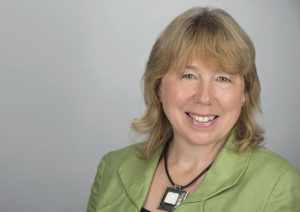In brief
In this blog, Linda Woolston offers a humane and insightful reflection on the role of love in relationships, including her relationships as a Business Coach.

Linda Woolston
Linda is an independent Business Coach, former HR Director, and Founding Partner of successful coaching business The Alliance, where she happily retains her long relationship as a consultant. She’s immensely grateful for growing up in Sunderland and experiencing a strong sense of community.

My Dad’s amazing neighbours. Today John from next door knocked on his door holding a pair of garden shears and asked if Dad would like him to cut down a bush that was now pressing against the conservatory. Dad gratefully said yes. At a recent café style Church service the congregation were invited to discuss what they would take with them if they moved house. Dad’s thoughtful response was his neighbours.
The support we got having one point of contact at the hospital from Louise (Acute Oncology Nurse Practitioner) in the last year of my Mam’s life. We knew we could ask her any questions we had and that she was there for all of us. Having Louise as a primary point of contact made it easier to navigate through the system, to join the dots, and to help us to do the best for Mam.
The woman at BA Customer service who I called to cancel a flight when Mam had died. Her compassion and kindness brought more tears to my eyes. Her response was human, loving.
Fran our neighbour who passed away peacefully at home earlier this year, who before she died thanked her neighbours as if it hadn’t been for their support she would not have been able to stay living at home.
I think of Barbara Frederickson¹ and her description of micro moments of love. What a difference those moments make. A smile, an acknowledgement, a moment where we connect as humans. It is the stuff of life.
Yet when I think of my work, what have I got to say. That blank feeling reappears! Thinking out loud…. I typically coach senior executives. In effect I’m in a position where I get paid to forge a relationship whereby, I and the client, by working together can make a difference to the client’s working life. It only works if the relationship works. So what are the ingredients that make it work?
One important ingredient is listening. I listen. I listen to understand. I listen in the manner I was taught by Nancy Kline² to ignite the other persons thoughts. I do not listen to reply or listen to disagree (both are embarrassingly common in life and organisations).
Apparently it is rare to be listened to, yet it is key to unlocking and unblocking thoughts; to feeling respected and to feeling equal. Respect and equality are key ingredients in the coaching relationship.
Love is not a word that is typically mentioned in a working environment yet, back to Barbara Fredrickson, or is it Love Actually…love is all around and it makes a massive difference to how we feel and how we function.
When coaching works, the client is able to think insightfully, with clarity. They are often more resourceful and able to identify actions that will make a difference to them, their teams and organisations. It often helps to alleviate stress and creates much needed space to explore, be creative and step back from the busyness of the day to day. Arguably whilst not labelled as such maybe coaching alongside the examples above are all a version of love, everyday love. Which is not how my work is usually described! More typically the experience would be described as positive, practical, creative, professional. Good words – solid business words.
If you took away the neighbours, the nurse, the capable call centre operator there is an economic and human cost. More anxiety, more need for care home spaces etc. I get paid to coach, it is what I do. I would like to think it is an investment. We want and need leaders in whatever field of work to be able to do their best thinking, to lead healthily, to create the best environment for themselves and others to flourish. It is not a forever relationship; Coaches are trained to ensure that dependencies are not created. We move on. Hopefully both enriched in some way however small or significant.
Good relationships matter whether it is the micro moment of connection with a stranger as you stand in a queue together; a neighbour; or a paid for relationship like the coach or the oncology nurse. At their best they enrich our experiences, our daily lives. Perhaps they are all examples of everyday love.
References
¹Barbara Frederickson: Love 2.0: Finding Happiness and Health in Moments of Connection
²Nancy Kline: Time to Think: Listening to Ignite the Human Mind
